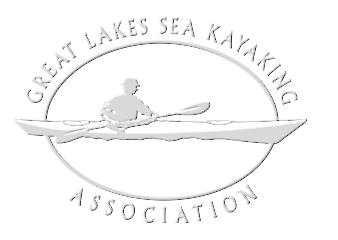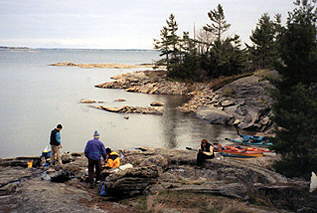by Johanna Wandel
I’ve never been one to read the instructions – usually, I need to screw up before I’ll look for the back of the package to try and figure out what I was supposed to do in the first place. My approach to kayaking has been similar: when I first started I took some lessons to learn things as basic as which side of the paddle is up and how to get into the boat. I did some workshops on bracing, but little stuck with me given that I’d never been on water which would require skills like this.
Since then, I’d applied my usual approach: keep doing it, and eventually you get better. By and large, this approach works. However, there are those situations that you don’t routinely do which you might end up in nevertheless. You know, those situations that we don’t always like to think about – sudden storms when we’re out on the water. Capsize. Rescue. Last spring, when I finally bought my own boat, I faced reality and acknowledged that practising wet exits three or four years ago and some fuzzy theory on braces in the back of my head weren’t good enough. Right around this time I joined GLSKA and signed up for Sam’s Lake Superior trip. Sam encouraged me to participate in Ron Coulson’s Instructional Weekend on Franklin Island in June, and I’m very glad I took the advice.
Our goals for the weekend were to learn/refresh the main types of braces and practice them. Furthermore, we were to spend some time on assisted and self-rescues – a good thing, too, since diligent bracing practice can easily lead to a need for rescues! Since the weekend was held early in the year (in time to use these skills on the season’s longer trips), Ron encouraged all to come equipped with wet or dry suits. The Franklin Island venue (Henrietta Point) was ideal since it afforded both exposed and sheltered waters to practise in.
We were eleven that weekend, of various skill levels – there were those who had done extended solo trips and those who had never been on a backcountry kayak trip, and the rest of us who fit somewhere in between. On Saturday morning, we all got into our boats and paddled out, and Ron demonstrated an assisted rescue. We were then encouraged to buddy up and practise both being rescuer and rescued, and I’m proud to report that we all took the plunge and were all competent enough to assist our partners back into our boats. Ron then discussed situations which could require self-rescue, and Sam demonstrated a paddle-float rescue. After that, we discussed various means of contact towing and practised this (I was a little chilly at this point, so welcomed the effort required to tow Ron a few hundred metres). Finally, Ron gave us all a refresher on low, high and sculling braces, and we practised those – some of us so eagerly that we got to use our newly-refreshed rescue skills!
If there is anything I would have changed about the weekend, it’s the weather. No, not the rain – I was fine with the rain – but the winds. When we did most or our rescue practice, the water was perfectly flat. However, we are most likely to need these skills in rough water, and it would have been good to spend some time doing just that once we were comfortable on flat water.
Of course, the weekend wasn’t just formal instruction. We had a lot of fun, too – Friday night was very rainy (so rainy that it kept our numbers lower than Ron had anticipated, since some cancelled on account of the poor weather forecast). However, we had an informal tarp-rigging workshop that afternoon, and had plenty of dry area to cook and get to know one another. If anything, being at close quarters under a few tarps likely made us get to know one another better than if we’d been scattered all over the large site, and Nancy’s tin of cookies didn’t hurt either.
On Saturday, after rescue, towing and bracing practice (not to mention lunch), Ron offered to lead a paddle to the Snake Islands. We were lucky with a sunny afternoon and not much wind, and Ron spent time with those of us who were less experienced and helped us with some of our strokes. Later the same day we found that the tarps had become unnecessary and we took some of them down and had a cosy campfire. On Sunday, Ron offered to lead a trip out to Red Rock lighthouse, but since the winds had really picked up this was accepted only by the more experienced and hardier members of our party (I was not among these.) while the rest of us either sat around and drank coffee (me!) or made our various ways back to Snug Harbour.
Ron is one of those exceptional teachers who leaves you feeling more confident in your own skills while also inspiring you to want to become a better paddler. I came away from the weekend wanting to spend more time in my boat – not just paddling to get from point A to point B, but practising some of the skills. Later this summer, I did just that when I spent some time on an afternoon during Sam’s Superior trip making sure I remembered how to do a paddle-float rescue, and I catch myself mentally and physically reviewing the braces from time to time. I still have a lot to learn, but fortunately, Ron has said he’d like to hold the weekend again next year!
The summer is winding down now, and looking back I can say that I’m lucky that I didn’t need to use any of the skills we practised that weekend for real. However, I can also say that I never once needed my PFD, and I wouldn’t consider kayaking without it – so I wonder why it took me so long to recognize that I needed to have current rescue skills? The awareness that I knew what to do in the event of a capsize sure made paddling all sorts of water more enjoyable – particularly so since I was almost always paddling with other people who had attended the same weekend and thus would be confident in rescuing me!
Thanks, Ron, for a fantastic weekend – I refreshed some skills, learned others, met some good people and had a lot of fun. Sign me up for next year!

